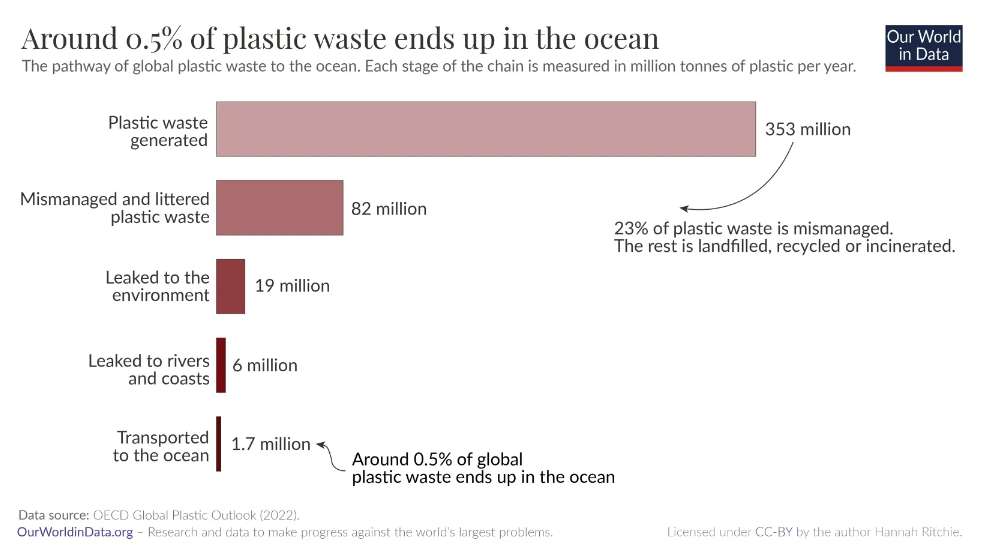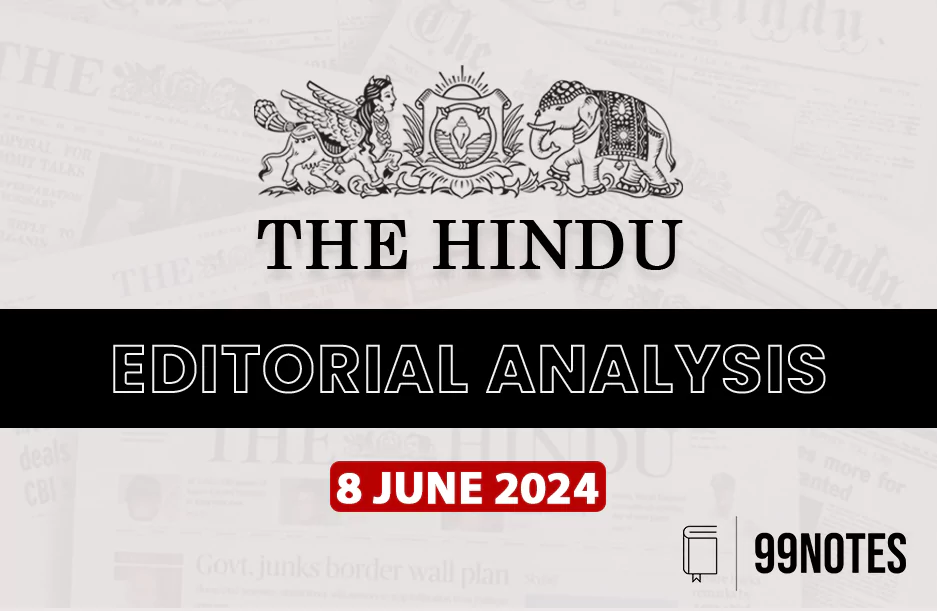8 JUNE 2024 : The Hindu Editorial Analysis
1. The Centre is notional, the States the real entities
(Source – The Hindu, International Edition – Page No. – 3)
| Topic: GS2 – Governance GS2 – Indian Polity – Federal Structure |
| Context |
| The 2024 general election results in India have surprised many, with regional parties gaining significant representation in Parliament.This shift is expected to enhance federalism and address contentious Centre-State relations, as States push for greater autonomy and equitable resource allocation amid ongoing political and financial disputes. |
General Election 2024 Results and Its Implications
Surprise Outcome and Democratisation:
- The 2024 general election results have surprised many, indicating a shift towards greater democratisation in India.
- Regional parties have performed well, securing representation on both the ruling party benches and the Opposition side in Parliament.
- This outcome is expected to strengthen federalism, crucial for India’s diverse nation, which had been experiencing strains recently.
Contentious Centre-State Relations:
- Centre-State relations became contentious during the election campaigning.
- The ruling party’s campaign ideas like ‘one nation one election’ and threats against Opposition leaders were perceived as threats to Opposition-ruled States.
- Opposition-ruled States have complained of step motherly treatment by the Centre, leading to protests in Delhi and State capitals.
- The Supreme Court noted a steady stream of States compelled to approach it against the Centre, indicating growing friction.
Specific Complaints from States:
- Kerala complained about inadequate transfer of resources.
- Karnataka highlighted issues with drought relief.
- West Bengal raised concerns about funding for the Mahatma Gandhi National Rural Employment Guarantee Scheme.
- These complaints suggest attempts to show Opposition-ruled States in a bad light.
Federalism and Cooperative Federalism:
- The Supreme Court emphasised the need for amicable resolution of Centre-State issues.
- Initially, the ruling party in 2014 talked about cooperative federalism.
- The introduction of the Goods and Services Tax in 2017 exemplified cooperative federalism, but since then, federalism has frayed, increasing discord between the Centre and Opposition-ruled States.
Diversity and Autonomy of States
Need for State Autonomy:
- India’s States are highly diverse, necessitating unique approaches to address their specific issues.
- Greater autonomy for States is essential for addressing local issues, which aligns with both democracy and federalism.
- A dominant Centre imposing its will on States does not bode well for India’s progress.
Resource Allocation and Conflicts:
- States face issues in education, health, and social services independently, but infrastructure and water sharing require inter-State agreements.
- Currency and defence issues require a common approach managed by the Centre.
- Expenditures need financing through taxes, non-tax sources, and borrowings, often leading to conflict.
Role of the Centre in Resource Collection:
- The Centre predominantly collects major taxes due to efficiency, including personal income tax, corporation tax, customs duty, and excise duty.
- The Goods and Services Tax is collected by both the Centre and States and shared.
- The Centre controls most resources and devolves funds to States for their responsibilities.
Finance Commission’s Role:
- The Finance Commission is appointed to decide on fund devolution from the Centre to States and the share each State receives.
- The Centre’s control over setting the Commission’s terms introduces bias favouring the Centre, creating conflict with States.
- Commissions often imply that States are fiscally irresponsible, reflecting the Centre’s bias.
Inter-State Tussles and Centre-State Relations
Divergent State Needs:
- States cannot have a common position due to their different stages of development and resource positions.
- Rich States contribute more but receive less, causing resentment despite poorer States providing them with markets and contributing to their growth.
- The Finance Commission tries to devolve more funds to poorer States to reduce inequality, but the gap remains wide.
Centre’s Allocation of Resources:
- The Centre allocates resources to States through the Finance Commission award and expenditures in States.
- Each State benefits from Centre’s expenditure within its territory, leading to job creation and prosperity.
- Accusations of the Centre favouring certain States, such as Gujarat and Uttar Pradesh, have been raised, causing friction.
Call for ‘Double Engine Sarkar’:
- The call for a ‘double engine ki sarkar’ implies that States with the same ruling party as the Centre will benefit more, undermining the autonomy of Opposition-ruled States.
- This approach weakens federalism and reduces State autonomy.
Issues in Federalism
Role of the Sixteenth Finance Commission:
- The Sixteenth Finance Commission is working to reverse fraying federalism and strengthen India as a ‘Union of States’.
- It could suggest even-handed treatment of States by the Centre and reduce friction by transferring more resources to poorer States.
- The Commission should also address governance issues at both Centre and State levels to improve investment productivity and development pace.
Devolution of Resources:
- Increasing the devolution of resources from the Centre to States beyond the current level of 41 percent could reduce Centre’s dominance.
- Joint schemes like the Public Distribution System or Mahatma Gandhi National Rural Employment Guarantee Scheme often see the Centre asserting credit, penalising non-compliant States.
- The Centre’s assertiveness with public funds, which are collected from and spent in States, undermines federalism.
Need for Joint Decision-Making:
- Utilisation of the country’s resources should be jointly decided by the Centre and States as equal partners.
- This has become more feasible with the changed political situation following the 2024 general election results, emphasising collaborative federalism for a diverse and democratic India.
| PYQ: From the resolution of contentious issues regarding distribution of legislative powers by the courts, ‘Principle of Federal Supremacy’ and ‘Harmonious Construction’ have emerged. Explain. (150 words/10m) (UPSC CSE (M) GS-2 2019) |
| Practice Question: Examine how the 2024 general election results and the rise of regional parties could impact federalism and Centre-State relations in India. (250 Words /15 marks) |
2. Remoulding the Global Plastics Treaty
(Source – The Hindu, International Edition – Page No. – 3)
| Topic: GS2 – International Relations – Agreements involving India or affecting India’s interests. |
| Context |
| As global efforts continue to formulate a legally binding treaty on plastic pollution, it is essential to recognize the role of informal waste collectors, who recycle a significant portion of plastic waste worldwide.Despite their crucial contributions to environmental sustainability and municipal waste management, these workers often face vulnerabilities and exclusion from policy frameworks.Integrating their perspectives into the Global Plastics Treaty is vital for ensuring social justice, protecting their livelihoods, and achieving effective and sustainable plastic waste management practices. |
Introduction to Plastic Pollution and Informal Waste Collectors

- Global plastic waste production was 353 million tonnes in 2019, more than double since 2000, and is expected to triple by 2060.
- Only 9% of this waste was recycled, with the remainder going to landfills, incineration, or uncontrolled disposal sites.
- Informal recycling workers contribute significantly to this 9%, handling 85% of the recycled plastic according to the United Nations Environment Programme.
Role and Contribution of Informal Waste Collectors
- Informal recycling workers collect, sort, and recover recyclable materials, reducing the burden on municipal budgets.
- They promote circular waste management solutions and help mitigate greenhouse gas emissions.
- Their work significantly reduces plastic content in landfills and dump sites, preventing plastic from leaking into the environment.
Vulnerabilities and Challenges Faced by Informal Workers
- Despite their contributions, informal waste collectors are often overlooked and face vulnerabilities.
- Risks include privatisation of waste management, waste-to-energy projects, and exclusion from Extended Producer Responsibility (EPR) policies.
- The informal waste and recovery sector (IWRS) accounts for 80% of municipal solid waste recovery in many cities, according to the UN-Habitat’s Waste Wise Cities Tool.
Impact of Inadequate Waste Management
- A study by UN-Habitat and the University of Leeds estimates that around 60 million tonnes of plastic from municipal solid waste pollute the environment due to inadequate collection services.
- Without the IWRS, the volume of plastic pollution would be higher.
- The recent Leave No One Behind Report highlights that strategies to reduce plastic pollution often neglect the recovery capacities of the IWRS, worsening livelihood vulnerabilities and undermining existing recovery systems.
The Global Plastics Treaty and Its Importance
- The Global Plastics Treaty aims to establish a legally binding agreement to reduce and eliminate plastic pollution.
- The Intergovernmental Negotiating Committee (INC) was established in early 2021 to draft this treaty.
- The INC has held several meetings, with active participation from the International Alliance of Waste Pickers (IAWP), which advocates for the inclusion of informal waste pickers in the treaty discussions.
| Plastic Treaty: |
| Global Effort: In early 2021, 175 countries agreed to develop a legally binding international treaty to address plastic pollution.Timeline: Negotiations are underway with the goal of finalising the treaty by the end of 2024.Focus: The treaty aims to regulate the entire lifecycle of plastics, including production, design, use and disposal.Key Actions: Potential measures include bans or limitations on single-use plastics and microplastics, promoting plastic redesign for recyclability, and improved waste management.Benefits: The treaty aims to create a circular economy for plastics, minimising waste and environmental impact. |
Goals of the International Alliance of Waste Pickers
- The International Alliance of Waste Pickers (IAWP) emphasises supporting the formalisation and integration of informal waste pickers into policy discussions.
- It advocates for the inclusion of waste pickers’ perspectives and solutions at every stage of policy and law implementation.
- Measures aim to acknowledge the historical contributions of waste pickers, protect their rights, and promote effective and sustainable plastic waste management practices.
Challenges in Formalising Informal Waste Sector
- There is no universally agreed-upon terminology for a just transition or a formal definition of the informal waste sector and its workforce.
- Clarifying these definitions is crucial for effective policy formulation and implementation.
India’s Role and Approach
- As a key representative from the Global South, India promotes an approach that enhances repair, reuse, refill, and recycling without necessarily eliminating plastics.
- India stresses the importance of considering country-specific circumstances and capacities.
- India’s informal waste pickers, who are indispensable, remain central to these discussions.
Need for Reform in Extended Producer Responsibility (EPR) Norms
- It is essential to rethink the formulation of Extended Producer Responsibility (EPR) norms to integrate the informal waste worker cohort into the new legal framework.
- This includes ensuring that their perspectives and livelihoods are protected in the new policies.
The Final Negotiations for the Global Plastics Treaty
- As the final round of negotiations for the Global Plastics Treaty approaches, a key question remains: how can a global instrument to end plastic pollution enable a just transition for nearly 15 million informal waste collectors?
- By incorporating their perspectives and ensuring their livelihoods are protected, the treaty can embody principles of social justice and equity.
- This approach will ensure that no one and no place are left behind in the global effort to combat plastic pollution.
Conclusion
- The inclusion of informal waste collectors in the Global Plastics Treaty discussions is crucial for achieving sustainable and equitable plastic waste management.
- Recognizing their contributions and ensuring their rights and livelihoods are protected will strengthen the treaty’s impact.
- A global agreement that supports a fair transition for these workers will promote social justice and environmental sustainability.
| Practice Question: Discuss the significance of incorporating informal waste collectors into international treaties on plastic pollution. How can their inclusion support both environmental sustainability and social justice? (150 Words /10 marks) |


